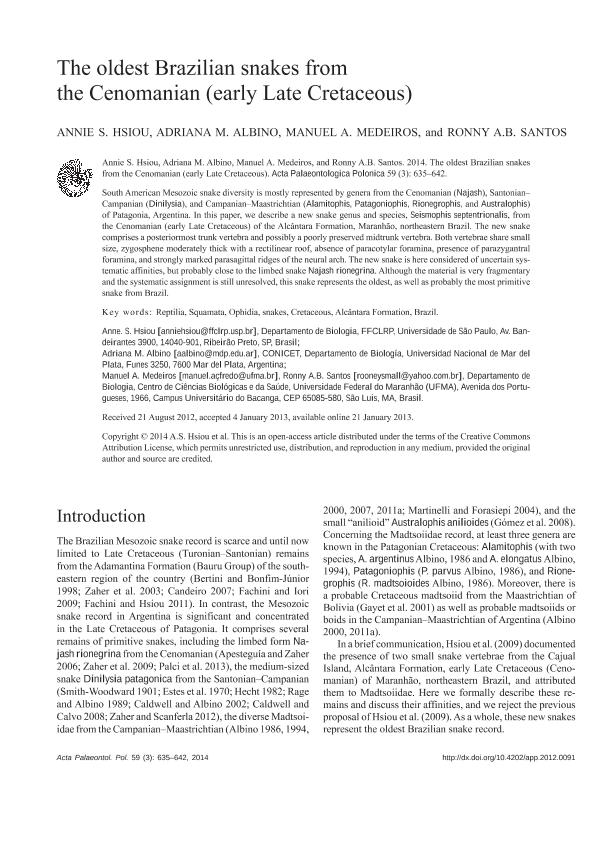Mostrar el registro sencillo del ítem
dc.contributor.author
Hsiou, Annie
dc.contributor.author
Albino, Adriana Maria

dc.contributor.author
Medeiros, Manuel
dc.contributor.author
Santos, Ronny
dc.date.available
2020-03-17T17:51:14Z
dc.date.issued
2014-09
dc.identifier.citation
Hsiou, Annie; Albino, Adriana Maria; Medeiros, Manuel; Santos, Ronny; The oldest Brazilian snakes from the cenomanian (Early Late Cretaceous); Polish Academy of Sciences. Institute of Paleobiology; Acta Palaeontologica Polonica; 59; 3; 9-2014; 635-642
dc.identifier.issn
0567-7920
dc.identifier.uri
http://hdl.handle.net/11336/99860
dc.description.abstract
South American Mesozoic snake diversity is mostly represented by genera from the Cenomanian (Najash), Santonian- Campanian (Dinilysia), and Campanian-Maastrichtian (Alamitophis, Patagoniophis, Rionegrophis, and Australophis) of Patagonia, Argentina. In this paper, we describe a new snake genus and species, Seismophis septentrionalis, from the Cenomanian (early Late Cretaceous) of the Alcântara Formation, Maranhão, northeastern Brazil. The new snake comprises a posteriormost trunk vertebra and possibly a poorly preserved midtrunk vertebra. Both vertebrae share small size, zygosphene moderately thick with a rectilinear roof, absence of paracotylar foramina, presence of parazygantral foramina, and strongly marked parasagittal ridges of the neural arch. The new snake is here considered of uncertain systematic affinities, but probably close to the limbed snake Najash rionegrina. Although the material is very fragmentary and the systematic assignment is still unresolved, this snake represents the oldest, as well as probably the most primitive snake from Brazil.
dc.format
application/pdf
dc.language.iso
eng
dc.publisher
Polish Academy of Sciences. Institute of Paleobiology

dc.rights
info:eu-repo/semantics/openAccess
dc.rights.uri
https://creativecommons.org/licenses/by/2.5/ar/
dc.subject
REPTILIA
dc.subject
SQUAMATA
dc.subject
OPHIDIA
dc.subject
SNAKES
dc.subject
CRETACEOUS
dc.subject
ALCANTARA FORMATION
dc.subject
BRAZIL
dc.subject.classification
Paleontología

dc.subject.classification
Ciencias de la Tierra y relacionadas con el Medio Ambiente

dc.subject.classification
CIENCIAS NATURALES Y EXACTAS

dc.title
The oldest Brazilian snakes from the cenomanian (Early Late Cretaceous)
dc.type
info:eu-repo/semantics/article
dc.type
info:ar-repo/semantics/artículo
dc.type
info:eu-repo/semantics/publishedVersion
dc.date.updated
2020-01-28T14:56:01Z
dc.identifier.eissn
1732-2421
dc.journal.volume
59
dc.journal.number
3
dc.journal.pagination
635-642
dc.journal.pais
Polonia

dc.journal.ciudad
Varsovia
dc.description.fil
Fil: Hsiou, Annie. Universidade de Sao Paulo; Brasil
dc.description.fil
Fil: Albino, Adriana Maria. Universidad Nacional de Mar del Plata. Facultad de Ciencias Exactas y Naturales. Departamento de Biología; Argentina. Consejo Nacional de Investigaciones Científicas y Técnicas. Centro Científico Tecnológico Conicet - Mar del Plata; Argentina
dc.description.fil
Fil: Medeiros, Manuel. Universidade Federal Do Maranhao; Brasil
dc.description.fil
Fil: Santos, Ronny. Universidade Federal Do Maranhao; Brasil
dc.journal.title
Acta Palaeontologica Polonica

dc.relation.alternativeid
info:eu-repo/semantics/altIdentifier/doi/http://dx.doi.org/10.4202/app.2012.0091
dc.relation.alternativeid
info:eu-repo/semantics/altIdentifier/url/http://www.app.pan.pl/article/item/app20120091.html
Archivos asociados
